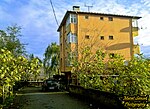Polonezköy Nature Park

Polonezköy Nature Park (Turkish: Polonezköy Tabiat Parkı) is a nature park in the village of Polonezköy in Istanbul, Turkey. Polonezköy is situated in the Beykoz district of Istanbul Province. The area was declared a nature park by the Ministry of Environment and Forests in 1994. It covers an area of about 3,004 ha (7,420 acres). It is the province's first, and in terms of area, largest, nature park. The protected area is named after the village of Polonezköy, which was settled in 1842 by a small group of Polish emigrants, after the failed November Uprising. The settlement was initially named "Adamköy" or "Adampol" (literally Adamville) in honor of Adam Jerzy Czartoryski, and was renamed later to "Polonez Karyesi". In 1923, it was changed to its current official name.The nature park offers many outdoor recreational activities such as picnicking, camping, trekking and orienteering. There is a 5 km (3.1 mi)-long hiking, cycling, and jogging course, as well as observation towers. There are also a number of restaurants. Lodging is available in a number of boarding houses and hotels in the village.
Excerpt from the Wikipedia article Polonezköy Nature Park (License: CC BY-SA 3.0, Authors, Images).Polonezköy Nature Park
Canfeda Çıkmazı,
Geographical coordinates (GPS) Address Nearby Places Show on map
Geographical coordinates (GPS)
| Latitude | Longitude |
|---|---|
| N 41.117777777778 ° | E 29.210277777778 ° |
Address
Canfeda Çıkmazı
Canfeda Çıkmazı
34829
Turkey
Open on Google Maps



